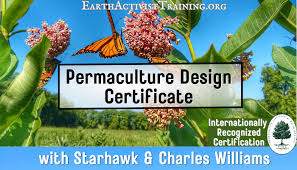Vegan Permaculture Design Course: Harmonizing Ethics and Ecology
Permaculture, a design system that mimics natural ecosystems to create sustainable human habitats, has been gaining popularity for its holistic approach to land use and community development. When combined with vegan principles, permaculture takes on an even deeper ethical dimension by promoting compassion for all living beings.
A vegan permaculture design course goes beyond traditional permaculture practices by emphasizing plant-based solutions for food production, soil fertility, and resource management. By excluding animal products from the design process, participants learn how to create regenerative systems that are not only environmentally friendly but also aligned with their ethical values.
During a vegan permaculture design course, students explore topics such as plant-based agriculture, water conservation, renewable energy systems, and biodiversity conservation through a lens of compassion and sustainability. They learn how to design resilient landscapes that support diverse plant species, promote wildlife habitat, and minimize harm to animals.
By integrating vegan ethics into permaculture design principles, participants in these courses gain a deeper understanding of the interconnectedness of all life forms and the importance of living in harmony with nature. They discover innovative ways to grow food without exploiting animals or depleting natural resources, leading to more regenerative and resilient ecosystems.
Whether you are a seasoned permaculturist looking to align your practice with your vegan values or someone interested in exploring the intersection of ethics and ecology, a vegan permaculture design course offers a unique opportunity to deepen your knowledge and skills in sustainable living.
Join us in harmonizing ethics and ecology through a vegan permaculture design course and be part of creating a more compassionate and sustainable world for all beings.
Mastering Vegan Permaculture: 6 Essential Tips for Sustainable, Plant-Based Design
- 1. Learn about plant-based permaculture practices to create sustainable and eco-friendly designs.
- 2. Understand the principles of veganism and how they can be integrated into permaculture design.
- 3. Explore innovative techniques for growing food without the use of animal products or by-products.
- 4. Study the importance of biodiversity and natural ecosystems in vegan permaculture design.
- 5. Gain hands-on experience in designing and implementing vegan permaculture projects.
- 6. Connect with like-minded individuals passionate about veganism and sustainable living through the course.
1. Learn about plant-based permaculture practices to create sustainable and eco-friendly designs.
Discover the transformative power of plant-based permaculture practices in our vegan permaculture design course. By learning how to integrate sustainable and eco-friendly design principles rooted in plant-based solutions, you will unlock the potential to create resilient landscapes that not only support biodiversity but also align with your ethical values. Embrace a holistic approach to land use and community development that prioritizes compassion for all living beings while fostering regenerative systems that promote harmony with nature.
2. Understand the principles of veganism and how they can be integrated into permaculture design.
To fully embrace the essence of a vegan permaculture design course, it is crucial to delve into the principles of veganism and explore how they can seamlessly intertwine with the core tenets of permaculture design. By understanding the ethical foundations of veganism, participants can learn to integrate compassion for all living beings into their land management strategies, food production methods, and ecosystem restoration efforts. This integration not only fosters a deeper connection with nature but also paves the way for creating regenerative systems that honor both ecological sustainability and animal welfare.
3. Explore innovative techniques for growing food without the use of animal products or by-products.
In a vegan permaculture design course, participants are encouraged to explore innovative techniques for growing food without the use of animal products or by-products. By embracing plant-based solutions and creative approaches to cultivation, students learn how to create sustainable food systems that are not reliant on animal inputs. This emphasis on ethical and environmentally conscious practices empowers individuals to design regenerative landscapes that support biodiversity, soil health, and healthy ecosystems while promoting compassion for all living beings.
4. Study the importance of biodiversity and natural ecosystems in vegan permaculture design.
In a vegan permaculture design course, it is crucial to study the significance of biodiversity and natural ecosystems. Understanding how diverse plant species, wildlife habitats, and ecological processes interact within an ecosystem is essential for creating regenerative and sustainable designs. By emphasizing the importance of biodiversity, participants learn how to build resilient landscapes that support a wide range of plant and animal life while promoting ecosystem health and balance. This holistic approach not only enhances the productivity of the land but also fosters a deeper connection to nature and a greater appreciation for the interconnectedness of all living beings.
5. Gain hands-on experience in designing and implementing vegan permaculture projects.
Participants in the vegan permaculture design course will have the valuable opportunity to gain hands-on experience in designing and implementing vegan permaculture projects. This practical aspect of the course allows students to apply their knowledge and skills in real-world settings, fostering a deeper understanding of how vegan principles can be integrated into permaculture design. By working on actual projects, participants can see firsthand the impact of their designs on the environment and community, empowering them to create regenerative systems that align with their ethical values.
6. Connect with like-minded individuals passionate about veganism and sustainable living through the course.
Connect with like-minded individuals passionate about veganism and sustainable living through the vegan permaculture design course. By engaging with a community of individuals who share your values and commitment to ethical practices, you can foster meaningful connections, exchange ideas, and collaborate on creating regenerative systems that benefit both people and the planet. Joining forces with like-minded peers not only enhances your learning experience but also provides a support network as you embark on your journey towards a more compassionate and sustainable lifestyle.

